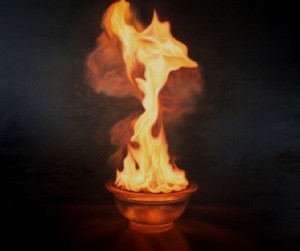Genesis 15 depicts a bloody mess.
And it is a mess with multiple levels:
Abram, told that he is destined to be the father of nations, is beginning to stress that his servant looks like his only heir. God repeats the promised of countless-as-stars descendants, but it is hard to embrace such words when an infant has never been held.
 God responded to Abram’s confirmation-seeking by instructing him to bring some animals. Together, they would enter a covenant ceremony. Abram set the stage by halving the animals (heifer, goat, ram, and birds). The slaughter pushed Abram into scarecrow duty, shooing off the vultures until dusk.
God responded to Abram’s confirmation-seeking by instructing him to bring some animals. Together, they would enter a covenant ceremony. Abram set the stage by halving the animals (heifer, goat, ram, and birds). The slaughter pushed Abram into scarecrow duty, shooing off the vultures until dusk.
So there is the bloody mess: A man old enough to be a grandfather is beating buzzards off of chopped corpses, awaiting a sign from a God who appears unwilling or unable to deliver on His promises. Abram should have known better than to believe such foolishness. Who would possibly observe him arm-flapping and bird-shooing, and identify him as the father of great nation, innumerably populated as it pumped blessing into the whole world?
And now night was coming. Just great.
 Scripture describes that a “dreadful and great darkness fell upon him” (Gen 15:12), and then from within the blackness, God delivered yet another shot. These promised descendants–the ones of whom not one yet existed–would travel a 400-year-stretch of slavery before even resembling a nation.
Scripture describes that a “dreadful and great darkness fell upon him” (Gen 15:12), and then from within the blackness, God delivered yet another shot. These promised descendants–the ones of whom not one yet existed–would travel a 400-year-stretch of slavery before even resembling a nation.
Did Abram envy those who knew not the darkness that came with God’s glorious promises? How much simpler it must have seemed to just live “one’s own life”, untouched by preposterous promises that raised ridiculous hopes! A “dreadful and great darkness” indeed.
And that is when it happened.
“When the sun had gone down and it was dark, behold, a smoking fire pot and a flaming torch passed between these pieces. On that day the Lord made a covenant with Abram…” (Gen 15:17-18)
Yahweh went on to declare the specific land that He would provide for Abraham’s descendents. He was not backing down on His promise; in fact, He was firming up the details.
And then, most dramatically, He was binding Himself to Abram. In the vivid imagery of that day’s covenant-cutting, God tweaks just one detail. Just as “blood brothers” might cut themselves and shake hand to display their sealed partnership, the halved animals created a corridor through which two partners would walk. Their shared strides through the butchered beasts spoke a solemn tone of commitment: “I will come through on my part of this agreement, lest such violence befall me.”
God’s revision to the common ceremony?
He walked alone.
 In the form of a smoking pot and flaming torch, Yahweh covenanted Himself to Abram.
In the form of a smoking pot and flaming torch, Yahweh covenanted Himself to Abram.
This future of promised descendants with a promised destination–it hung on God alone. God was deadly serious about delivering on His word. His faithfulness was woven into His very existence–He would fulfill His vow. And it would not hinge on Abram’s faded verility or Sarai’s infertility.
God’s promised reality would hang, every ounce of it, upon His provision and power.
Abram’s role was to trust and obey.
And every believer, one of the stars in Abram’s sky, is today called to a similar dance of faith. We are called into lives of fruitfulness, influence, and blessing vastly beyond our means.
Sometimes, that will feel like a bloody mess.
All times, our role will be like Abram’s–to trust the Flaming One and to walk obediently as He reveals Himself to us.
YOUR TURN: What has God taught you about trusting Him? Are you struggling to trust today? Ever had an experience in which you just “knew” that He would come through? Your input makes this post better!
[You can subscribe to this blog by RSS or email, in this page’s upper right corner.]

